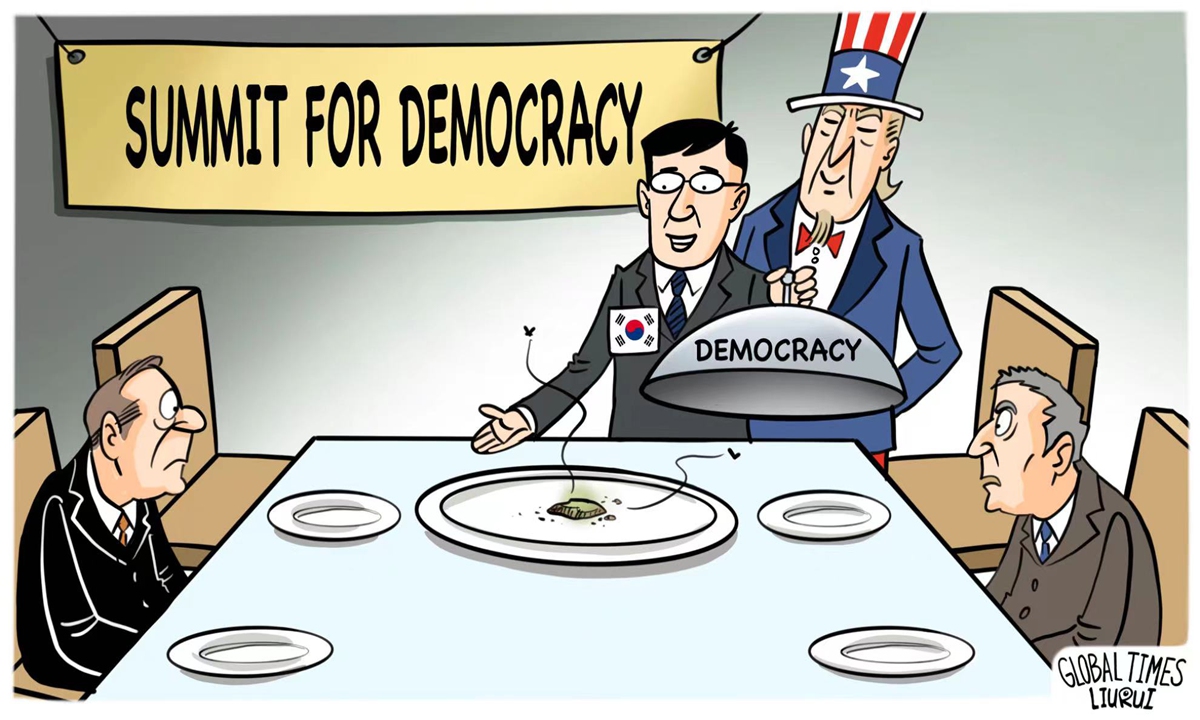The third “Summit for Democracy,” initiated by the Biden administration of the US, is taking place in Seoul, South Korea between March 18 and 20. It’s been dubbed a “triple-low summit”: low public attention, low international influence, and low enthusiasm from all parties. The host country, South Korea, has not disclosed the list of participating countries or leaders, and whether the next summit will be held is also a question. Even the true protagonist, the US, seems disheartened; Secretary of State Antony Blinken, who led the delegation, only attended the event in South Korea on March 18, and then flew to the next stop, the Philippines. Some Western media outlets have directly asked: The initial energy and dynamism of the Summit for Democracy has evaporated. Is it all over for the World Summit for Democracy?
From Washington’s staging of the drama under the guise of democracy with grand ambitions of “reclaiming global leadership” and “strengthening democracy to counter authoritarianism” in 2021 to now, it’s only been three years. The resolute slogans and promises of politicians, the Western media’s hype about the “confrontation between two orders,” compared to today’s desolate scene, have become nothing but jokes. With the US elections scheduled for this year and due to well-known reasons, Washington itself is uncertain whether this year’s summit will be the last. Although it’s premature to make a final judge, the spectacle of the “Summit for Democracy” has already descended into an embarrassing farce.
Of course, the summit isn’t entirely meaningless. It serves as a negative example, with strong “educational significance” for the international community, allowing everyone to see clearly what the so-called “rules-based international order” championed by the US looks like. First, this is a world divided into hierarchies by the US, with the US and its allies at the pinnacle of the pyramid, while nearly half of the world’s countries don’t even have the qualification to participate. Second, the rights and individualities of countries to explore their own paths of development are suppressed, yielding to the US’ singular definition of “democracy,” ultimately serving the hegemonic needs of the US. Third, the achievements of human technological progress, including artificial intelligence, digital technology, etc., are also framed within the ideological discourse of the US, thus suffocating the future development space of developing countries.
The US initially aimed to showcase its “leadership” by holding the “Summit for Democracy,” but now it has backfired. Instead of gaining attention, it has exposed its true intentions. Commentaries from African media are incisive: The “Summit for Democracy” has painted a damning portrait of American democracy in the eyes of the world, “speaking volumes about the waning influence of the US.” The US has proclaimed itself as the “commander-in-chief” of the so-called “democratic camp,” weaponizing democracy as a political tool to seek to maintain its dominant position, dividing the world in an arbitrary manner and sowing seeds of discord.
Other countries in the world, whether they participated in the summit or not, have seen through the essence of American democracy through the three editions of the summit. The decline of the “Summit for Democracy” is inevitable, but the rapid speed at which it has cooled down is somewhat surprising, indicating that both the US itself and the outside world still somewhat overestimate it, and the international distrust of American democracy is underestimated.
Of course, the US has not completely abandoned the idea of playing the “Summit for Democracy” card. Allowing South Korea to host the third “Summit for Democracy” seems like a reward for South Korea, which is eager to enhance its international influence and aims to become a “global pivotal state.” For the US, having South Korea host can increase the representativeness of the “Summit for Democracy,” resolve external doubts about the US controlling the “Summit for democracy,” and also share costs and pressure. However, South Korea must realize that hosting the “Summit for Democracy” will not enhance its international influence or make it a “global pivotal state.” To some extent, the “Summit for Democracy” is becoming a hot potato, and South Korea may end up getting burned by taking over to host it.
Is there a need for countries around the world to exchange and learn from each other’s experiences in building democratic politics? Of course, but it should not be done in a self-centered manner, nor should it be a case of “the US making a profit while others pretend to cooperate.” The garden of human civilization is rich and diverse, and democracy in each country should also flourish. Setting “democratic standards” according to a single model is precisely undemocratic. Not to mention interfering in other countries’ internal affairs under the guise of “democracy,” causing actual harm to the interests of the people of other countries.
The reason why the “Summit for Democracy” has become a “chicken rib” in the US is fundamentally because the US has a wrong initial intention, using democracy as a tool. If it is seen as a tool, it has a limited lifespan, while democracy has no “expiration date.” Human history has no so-called “end,’ and the “end of history theory” has been overturned by history. The process of exploring the development path suitable for each country is still ongoing. In this regard, the US is also not an “exception.”











